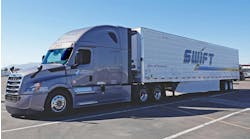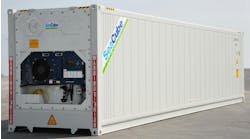Great Dane closes long-time Savannah plant
January 12 was one of the strangest days of Chris Hammond IV's professional life. As he rode through the manufacturing facility in Great Dane Trailers' plant in Savannah, Georgia, he felt like he was in the grip of a cruel time warp. Is this Sunday? Or Monday? He thought.
He knew in his heart that it was Monday, but it sure looked and sounded like Sunday. Machinery was not manned and trailers were not moving. The only sounds he heard were the faint echoes of a three-man skeleton crew that was packing up leftover parts that would be shipped to Great Dane's plant in Brazil, Indiana.
“It was an unusual feeling,” said Hammond, 41, vice president of dealer sales. “It was weird.”
Three days earlier, the last trailer rolled off the assembly line at the Savannah facility. For the record, it was a reefer headed for Sysco.
Great Dane, which was founded in 1900 in Savannah and built its first trailer there in 1930, announced in November its plans to close the Savannah facility, citing the effect of the extended economic downturn on the transportation industry coupled with the need for more efficient production.
The plan is to retain the corporate offices, which house the research and development lab, sales and marketing, accounting, customer service, and engineering.
January 8 was cloaked in sadness. Great Dane gathered its 270 employees who would lose their jobs, fed them breakfast, and took group pictures. Savannah TV station WTOC (Channel 11) documented the day as employees reminisced, some crying.
“To be honest, it broke my heart,” said Chris' father, retired Great Dane president Kit Hammond, 69.
Kit's father, retired chairman of the board Chris Hammond II, 96, was there when the first refrigerated trailer rolled off the assembly line in the 1940s. “It's like a funeral service,” he said.
How loyal have the employees been? Well, one of them — former plant manager, Dewey Cribbs, who started working in the plant at age 15 and remained for 53 years - requested that the outline of a Great Dane be carved into his granite tombstone. When he was buried on May 6, 2002, he wore his 50-year service pin on the lapel of his coat.
“I'm sure that 2,000 years from now, when some archaeologists are digging this up, they're not going to expect to find that,” Kit said.
Rich history
Reflecting days after the plant closing ceremony, Kit said all three of them — himself, his father, and his son — were “very emotional. We grew up with a lot of the employees. I worked with a lot of the fathers of the kids in the plant. I call them ‘kids.’ Most of them have been there 30 to 35 years. It always was like family.
“For me, I can remember when I was a kid, I'd come out with my father right after World War II, and the company had a Great Dane mascot. The watchman kept it and we'd play with it and have a great time. Then, when I was in my early teens, we got a Great Dane ourselves and named it Van Trailer. And we had that dog for years.”
When Chris IV was 5 or 6 years old, Kit would bring him into the plant and they'd wander around. Amid the roar of the machinery, Chris would ask his dad, “What's going on out there?” And his dad would say, “The little baby trailers are being made.” And for the longest time, he thought “the big trailers were making the little trailers.”
Chris' most poignant adult memory came 15 years ago when he had ascended to salesman.
“We had 20 really heavy-spec'd dry vans,” he said. “Savannah was about the only plant in the world that could build this spec. I remember being nervous. I was thinking, ‘If this trailer is wrong and we build this thing, my boss is going to shoot me.’ I came to the plant for the pilot and the guys were saying, ‘I hope it's right, because behind that group of trailers is the rest of the order.’ They had already built them because they didn't have a lot of other work going on.
“We're standing there. We had all the customers looking at it. At the end, after looking at it for hours, the only problem they had was that they didn't like where the tag lamp was. I literally had been sweating, thinking, ‘If they need a dimensional change, we're dead.’ I remember telling the customers, ‘I'm glad the tag lamp is the only problem, because I think we can handle that.’ That was probably the most nervous I ever was as a young salesman.”
And now, the plant is empty, and all that remains are the memories.
“Great Dane has been a part of the community since 1900,” Kit said. “It survived 108 years, not always in the trailer business. In the end, the only type of trailer we built in Savannah was refrigerated trailers.
“It's been a long time. What fascinates me is there have been a dozen different types of trailers manufactured in that plant. Virtually every conceivable trailer: truck bodies, marine and domestic containers, refrigerated trailers, van trailers, flat trailers, lowboy trailers, gas/petroleum tank trailers, asphalt, grain, bulk fruit, open top. Everything except dump trailers has been built in that plant.”


